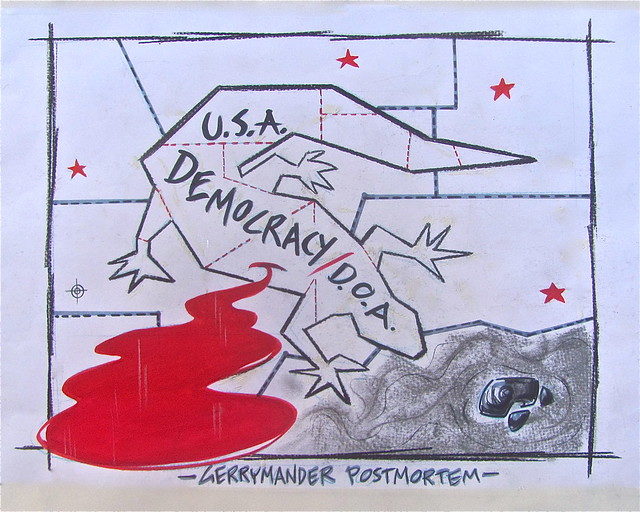The United State’s Supreme Court five to four decision on June 27, 2019, to allow the creation of explicitly partisan and gerrymandered Congressional districts is the latest of a series of actions by a suborned Republican Party and the states they dominate to dismantle democracy and its fundamental principle of majority rule in the United States.
State legislatures with Republican majorities have flouted democratic principles by purging nonwhites from voter rolls, closing voting precincts in communities of color, and imposing barriers to voting for people with felony convictions obtained in criminal and legal systems that disproportionately target nonwhites.
Although racial gerrymandering has been declared illegal and unconstitutional by previous court decisions, this new ruling allows for a cynical runaround of these decisions by ruling that overtly partisan gerrymandering presents “political questions beyond the reach of the federal courts,” according to Chief Justice Robert Thomas who, along with the two newest Justices pushed by the alt-right Federalist Society and picked by President Donald Trump, voted with the majority.
Even before this decision, Republican and white voters already held a disproportionate number of House seats despite receiving far fewer votes at the national level. Following this decision, legislatures in largely small and rural states will now have a green light to continue to dilute Black, Hispanic, liberal and urban votes by creating preposterous congressional districts that guarantee Republican and white majorities.

While the practice of gerrymandering is corrosive for democracy in general, it is also an issue that effects Californian voters in particular. California has long been drastically underrepresented in the United States Senate due to the anachronistic system in which each state—from Wyoming with 579,315 people to California with 39,536,653—each get two Senators apiece.
The enormously disproportionate nature of the Senate is supposed to be counterbalanced by the House of Representatives, where seats are allotted by population not state. With partisan gerrymandering, however, this natural advantage of the bigger states—of which California is by far the biggest with over 10 million more people than second-ranked Texas—is seriously undermined and creates in the House, as in the Senate, an environment in which a minority of largely white voters in small and rural states can thwart the practice of real democracy.
California ended partisan gerrymandering in the state over a decade ago and has worked hard to deepen and expand democracy at home by making voting easier and more accessible for its thriving and uniquely diverse population. Yet multi-ethnic California watches as other states coordinate their effort to do exactly the opposite.
It is now time for the citizens of the Golden State to realize that if they want to have real representation at home and on the international stage, a basic human right guaranteed by both the Californian and US Constitutions as well as the Charter of the United Nations, they will have to achieve it in a California that dares to act independently in the defense of their democracy under determined attack from domestic sources.
